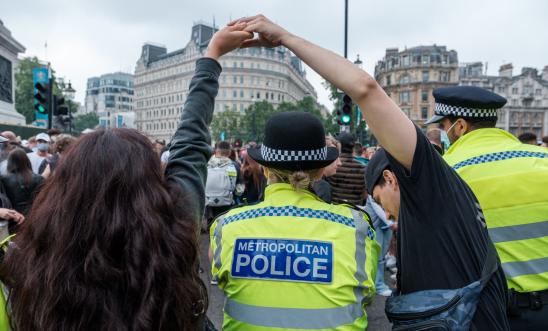
Press releases
UK: passing of controversial Public Order Bill is 'alarming'

‘It is deeply irresponsible to hand yet more powers to the police in this area’ - Oliver Feeley-Sprague
Responding to Parliament’s passing of the highly controversial Public Order Bill this afternoon, Oliver Feeley-Sprague, Amnesty International UK’s Military, Security and Police Director, said:
“The passing of this new law, which gives police unprecedented powers to restrict the right to protest, is alarming.
“It is deeply irresponsible to hand yet more powers to the police in this area, especially in light of Baroness Casey’s damning report that found deep-rooted institutional racism, homophobia and misogyny in the Met.
“This new law will almost certainly have a chilling effect by seriously discouraging people from joining protests in the first place - especially if they know they risk being subjected to serious mistreatment by the police.
“From the anti-slavery movement, to the Suffragettes, to Stop the War protests or Fridays for Future: the UK has a long and proud history of protest.“People Power has always been celebrated, tolerated and even facilitated in Britain and has helped forge the society we live in today.
“Protest is meant to be disruptive, it can be very inconvenient, but it is part of the bedrock of a healthy, open society. To prevent people speaking truth to power is to effectively muzzle discontent and brazenly stop everyone’s ability to hold the powerful to account.
“Chilling laws like this risk the UK slipping further towards authoritarianism.”
Serious threat
In October last year, Amnesty UK was part of a coalition of human rights, privacy, criminal justice, democracy, children's rights, international development, environment, freedom of speech, violence against women and girls, refugee and migrant rights, community and faith groups warning that the bill presented a serious threat to the rights of free speech and the right of free assembly in the United Kingdom. The bill is set to become law just months after draconian anti-protest measures were enacted in the Policing, Crime, Sentencing and Courts Act.